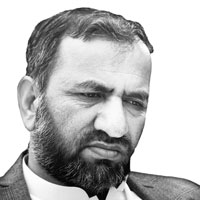KABUL — Hamidullah, a 28-year-old in the city of Kunduz, about 200 miles north of Kabul, had gotten up before dawn on Monday morning and was on his way to the mosque to pray when gunmen stopped him and told him to go back home.
“I said, ‘Who are you?’ They said, ‘We are Taliban, go back home and stay home. Do not come out. There will be a fight and you may get hurt.”
Hamidullah was surprised, to say the least. “The night before, I went to sleep at 11, and life was going on as normal in Kunduz,” he told The Daily Beast over the phone. “Five hours later I was under a Taliban regime.”
In the Afghan capital and in Washington, there was at least as much surprise that for the first time since the Taliban regime was ousted by the American-led invasion in 2003, the group has managed to take back a major city. The fall of Kunduz, a town of 200,000, even if it proves to be temporary, makes it appear that the Afghan military cannot function effectively without the assistance of the U.S. and NATO troops that formally ended their combat operations at the end of 2014.
Afghan President Ashraf Ghani, just finishing his first year in office, has vowed to take the Kunduz back, and reports of intense fighting circulated on Tuesday.
Taliban sources say it is not their goal to hold the city forever. But by drawing the Afghan army into a situation where many civilians may be killed, especially if the government troops on the ground are supported by U.S. air strikes, the Taliban can heighten their propaganda victory still further.
A Doctors Without Borders/Médecins Sans Frontières (MSF) trauma hospital already has reported it is overwhelmed by emergency cases. Doctors there said on Tuesday they were treating 171 wounded people, including 46 children. Most were suffering from gunshot wounds, and 50 of the patients were in critical condition.
“I thought after the Taliban collapsed in 2001 they would never be in power again, but I was wrong,” said Jan Muhammad, another Kunduz resident. “They could even come back to Kabul.”
Retired Gen. Jabar Qahraman, a former communist who is now in the Afghan parliament, told journalists in Kabul he had seen many defenses collapse suddenly in the past, but never anything quite as shocking as the fall of Kunduz: “I swear to God, the Taliban were not more than 300 and the Afghan [government] forces were about 2,000,” Qahraman said. “The Afghan army has the best equipment and large numbers but the lack of military management let Kunduz fall into the hands of the Taliban.”
Many are putting the blame on the local warlord, Mir Alam Khan. He and his militias perpetrated “all kinds of atrocities on local people,” according to a member of the provincial council.
But the Taliban have had their problems as well. Since the death of their longtime leader, Mullah Omar, was made public in July, a struggle for leadership and division in the ranks have been out in the open. Meanwhile, the so-called Islamic State, a growing presence in the Afghan theater, has been poaching leaders and fighters.
The taking of Kunduz shores up the credibility of Omar’s successor, Mullah Mansour, and should allow him to consolidate his position. It also, clearly, boosts the morale of Taliban fighters, encouraging them to think that if they could take control of a city this size, they might take Kabul as well.
Kunduz, near the border with Tajikistan, has always been important to the Taliban. In 1997, they were besieged and cut off by troops from the Northern Alliance for months, but never surrendered the city until the total collapse of the Taliban regime in 2001. The province is a hub for the lucrative drug trade and smuggling operations into Central Asia that will help fill Taliban coffers.
Last month, a video circulated that showed hundreds of Taliban fighters pledging allegiance to Mullah Mansour. According to one Taliban commander who spoke to The Daily Beast, Mansour asked who might take over a province and dedicate it to the soul of Mullah Omar. The Taliban’s shadow governor of Kunduz, Mullah Abdul Salam, said he would take the provincial capital—and so, it appears, he has.
As if the fall of Kunduz were not a bitter twist for the government already, Mullah Abdul Salam’s involvement is especially embarrassing. He and other prominent Taliban had been captured in Karachi by Pakistani authorities in 2010. But in 2013, then-President Hamid Karzai, as a goodwill gesture toward the Taliban during efforts to start peace talks, released unconditionally Mullah Abdul Salam and another Taliban leader, Mullah Muhammad Akhond. On Monday, the first as Taliban provincial governor and the second as military commander, took the city.






